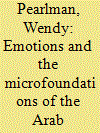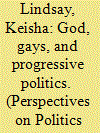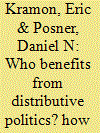|
|
|
Sort Order |
|
|
|
Items / Page
|
|
|
|
|
|
|
| Srl | Item |
| 1 |
ID:
121595


|
|
|
|
|
| Publication |
2013.
|
| Summary/Abstract |
Experimental evidence in cognitive psychology and behavioral economics is transforming the way political science scholars think about how humans make decisions in areas of high complexity, uncertainty, and risk. Nearly all those studies utilize convenience samples of university students, but in the real world political elites actually make most pivotal political decisions such as threatening war or changing the course of economic policy. Highly experienced elites are more likely to exhibit the attributes of rational decision-making; and over the last fifteen years a wealth of studies suggest that such elites are likely to be more skilled in strategic bargaining than samples with less germane experience. However, elites are also more likely to suffer overconfidence, which degrades decision-making skills. We illustrate implications for political science with a case study of crisis bargaining between the US and North Korea. Variations in the experience of US elite decision-makers between 2002 and 2006 plausibly explain the large shift in US crisis signaling better than other rival hypotheses such as "Iraq fatigue." Beyond crisis bargaining other major political science theories might benefit from attention to the attributes of individual decision-makers.
|
|
|
|
|
|
|
|
|
|
|
|
|
|
|
|
| 2 |
ID:
121596


|
|
|
|
|
| Publication |
2013.
|
| Summary/Abstract |
In any political setting, a few people will defy political authority. The main challenge for theories of rebellion is to explain when and why others join en masse. Scholarship on social movements typically develops answers to this puzzle on the basis of either of two microfoundations. Explanations that conceptualize individuals as utility-maximizers contend that they protest as a means to other ends. Explanations that see individuals as driven by values and beliefs suggest that people protest for the inherent benefit of voicing dissent. Both perspectives generate compelling explanations. Yet how do purposeful individuals act when utilitarian calculations and cherished values recommend contrary courses of action? Why might an actor prioritize one or the other at different points in time? Taking on these questions, I argue for an approach to microfoundations that focuses on emotions. Emotions such as fear, sadness, and shame promote pessimistic assessments, risk aversion, and a low sense of control. Such dispiriting emotions encourage individuals to prioritize security and resign to political circumstances, even when they contradict values of dignity. By contrast, anger, joy, and pride promote optimistic assessments, risk acceptance, and feelings of personal efficacy. Such emboldening emotions encourage prioritization of dignity and increase willingness to engage in resistance, even when it jeopardizes security. When instrumentality and values offer different answers to the question of whether to resign or rebel, therefore, emotions can shift individuals toward one or the other. I ground this argument in findings from the neurosciences and illustrate it with evidence from the 2011 uprisings in Tunisia and Egypt and the absence of an uprising in Algeria.
|
|
|
|
|
|
|
|
|
|
|
|
|
|
|
|
| 3 |
ID:
121598


|
|
|
|
|
| Publication |
2013.
|
| Summary/Abstract |
Although pacifism and nonviolence bear a close relationship to one another historically, pacifism is the ideological assertion that war and violence should be rejected in political and personal life, whereas nonviolence refers to a distinct set of political practices. Unlike other modern ideologies such as liberalism and socialism, pacifism has never gained widespread acceptance among a significant portion of humanity and seems to remain a minority position among most of the peoples of the world. Even among those who use nonviolent techniques, the conventional wisdom that physical violence is necessary under certain circumstances often prevails. However, a growing body of empirical evidence shows that the methods of nonviolence are more likely to succeed than methods of violence across a wide variety of circumstances and that more people are using nonviolence around the world. At the same time, both the effectiveness of military and material superiority in achieving political ends and the incidence of warfare and violence appear to be waning. In a remarkable example of convergence between empirical social science and political theory, explanations for the effectiveness of nonviolence relative to violence point to a people-centered understanding of power. This research can provide a basis for a reinvigorated and pragmatic brand of pacifism that refocuses the attention of political scientists on the organization, actions, and loyalties of people as opposed to technologies of domination and destruction.
|
|
|
|
|
|
|
|
|
|
|
|
|
|
|
|
| 4 |
ID:
121599


|
|
|
|
|
| Publication |
2013.
|
| Summary/Abstract |
I draw on conservative black Christians' claims regarding their co-constitutive racial, religious, class, and sexual subordination to demonstrate that intersectionality is a heuristic that can be used to advance a range of normative arguments. My research rejects traditional understandings of intersectionality as a necessarily progressive analytical framework, as well as recent discussions that suggest that intersectionality's use for conservative ends is evidence of its theoretical underdevelopment. My analysis also reveals that by positing interlocking racism, classism, heterophobia, and anti-Christian bigotry as blacks' "true" experience of oppression, conservative black Christians guide political scientists to consider 1) that intersectional analysis is central rather than antithetical to in-group policing; 2) that we can best interrogate the standards that social groups use to police their boundaries when we adopt a normative-critical conception of power, and 3) that power so defined challenges the erroneous assumption that our role is to either describe or prescribe social reality.
|
|
|
|
|
|
|
|
|
|
|
|
|
|
|
|
| 5 |
ID:
121597


|
|
|
|
|
| Publication |
2013.
|
| Summary/Abstract |
This article proposes the concept "extra-lethal violence" to focus analytic attention on the acts of physical, face-to-face violence that transgress shared norms about the proper treatment of persons and bodies. Examples of extra-lethal violence include forcing victims to dance and sing before killing them, souvenir-taking and mutilation. The main puzzle of extra-lethal violence is why it occurs at all given the time and effort it takes to enact such brutalities and the potential repercussions perpetrators risk by doing so. Current approaches cannot account for this puzzle because extra-lethal violence seems to follow a different logic from strategic calculation. To investigate one alternative logic-the logic of display-the article proposes a performative analytic framework. A performative lens focuses attention on the process by which actors stage violence for graphic effect. It highlights the range of roles, participants, and activities that contribute to the production process as a whole. To demonstrate the value of a performative approach, the article applies this framework to three very different extra-lethal episodes: the massacre at My Lai during the Vietnam War, the rape and killing of two women during the Rwandan genocide, and a lynching that took place in rural Maryland. The article concludes by sketching a typology of performance processes and by considering the policy implications of this type of theorizing and knowledge.
|
|
|
|
|
|
|
|
|
|
|
|
|
|
|
|
| 6 |
ID:
121600


|
|
|
|
|
| Publication |
2013.
|
| Summary/Abstract |
Papers in the burgeoning empirical literature on distributive politics often focus their analysis on the pattern of distribution of a single patronage good-for example, cash transfers, roads, education spending, electrification, or targeted grants. Yet because governments can favor constituencies through the targeting of multiple public and private goods, drawing general conclusions about distributive politics by investigating just one (or even a few) good(s) can be misleading. We demonstrate the severity of this problem by investigating a particular manifestation of distributive politics-ethnic favoritism-in a particular setting-Africa-and show that the conclusions one draws about who benefits from government allocation decisions can vary markedly depending on the outcome one happens to study. Our findings suggest the need for caution in making general claims about who benefits from distributive politics and raise questions about extant theoretical conclusions that are based on empirical work that focuses on a single distributive outcome. The findings also provide a foundation for a new research agenda aimed at identifying the reasons why political leaders choose to favor their supporters with some public and private goods rather than others.
|
|
|
|
|
|
|
|
|
|
|
|
|
|
|
|
|
|
|
|
|